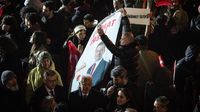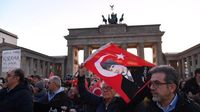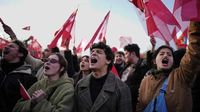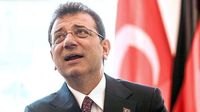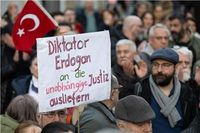In a striking turn of events, Istanbul Mayor Ekrem Imamoglu was arrested on March 19, 2025, just days before he was expected to be nominated as the presidential candidate for Turkey's main opposition party, the CHP (Republican People's Party). This pivotal moment has triggered massive protests both in Turkey and internationally, particularly among Turkish communities in Germany.
On the evening of March 19, approximately 160 demonstrators took to the streets of Frankfurt, Germany, rallying against Imamoglu's arrest. Protesters brandished signs that labeled Turkey's President Recep Tayyip Erdogan as a dictator, reflecting a widespread discontent over the political climate in Turkey. The demonstration commenced peacefully, highlighting the growing support for Imamoglu among the Turkish diaspora.
Imamoglu, seen as Erdogan's principal rival, faces serious allegations from the Turkish government, including corruption and charges of supporting terrorism. His arrest has been labeled a politically motivated attack by Erdogan’s regime, as Imamoglu had emerged as a prominent figure in the upcoming elections. The CHP denounced the situation as a "civil coup," asserting that the move was intended to dismantle opposition ahead of necessary democratic processes.
The protests didn't just unfold in Germany; Istanbul saw thousands flood the streets, defying a demonstrative ban imposed by local authorities. Reports from various media outlets indicated that police had utilized tear gas and other crowd control methods in anticipation of unrest. Major clashes erupted at several protest sites, particularly around Istanbul's city hall and major universities, where students mobilized to stand against the arrest.
Following news of his detention, significant responses emerged from political figures in Germany. Berlin's Mayor Kai Wegner expressed deep concern, stating, "Freie Wahlen und eine unabhängige Justiz sind Grundpfeiler für die Demokratie. Berlin fühlt sich seiner langjährigen Partnerschaft mit Istanbul verbunden und verpflichtet. Solidarität mit Ekrem İmamoğlu." This sentiment echoed across party lines, with numerous politicians emphasizing the need for solidarity with those opposing authoritarian tendencies.
Wegner’s planned visit to Istanbul, set for early April, now hangs in the balance as he considers the implications of Imamoglu’s arrest. The SPD (Social Democratic Party) urged that now, perhaps more than ever, it's vital to show support by making the trip: "Partnerschaft bedeutet, auch in schwierigen Zeiten zur Seite zu stehen," noted MP Melanie Kuehnemann-Grunow.
Conversely, opinions diverge within German politics; Kristin Brinker, the chairwoman of the AfD party, asserted that should Wegner decide to visit Istanbul, he must address Imamoglu's situation openly and without ambiguity, reflecting on the ongoing repression within Turkey.
The tumultuous backdrop of this arrest not only stirs local opposition but also casts a shadow on Turkey's capital markets. The Turkish lira plunged to its nadir against the US dollar following Imamoglu's capture, signifying investor fears and instability in the region. The country's already volatile political climate intensifies as Erdogan's administration silences dissenting voices, exacerbating concerns about democracy's future in Turkey.
EU leaders, including Commission President Ursula von der Leyen, have also voiced their apprehensions, calling Imamoglu's arrest "extremely worrying". These statements emphasize the global ramifications of Turkey's internal politics, linking them to broader discussions of democratic principles and governance. The German government's stance has been firm: they have labeled this incident a blatant setback for democratic integrity, emphasizing the importance of upholding the rule of law and judicial independence.
Imamoglu's arrest has acted as a catalyst for a nationwide conversation regarding political representation and the future of Turkey's democracy. In recent months, escalated legal actions against opposition figures have raised alarms about increasing repression under Erdogan's administration. Critics argue that the justice system has become a tool for political expediency rather than serving its foundational purpose.
As protests continue in various cities, including significant demonstrations in Ankara and Istanbul, Turkish authorities have taken measures to minimize dissent by restricting access to social media platforms and mobilizing police forces across affected areas. The arrests reached beyond Imamoglu, with reports suggesting that at least 80 additional individuals were detained following the protests, reflecting a wider crackdown on dissent.
In conclusion, Imamoglu’s arrest is not merely a local political incident; it signifies a deeper crisis in Turkey’s democratic distribution. The reactions unfolding across national borders highlight the urgency with which the international community must address the implications for democracy in Turkey. As Erdogan's government grapples with increasing internal dissent, the road ahead remains fraught with challenges for both the Turkish people and those globally advocating for democracy.
